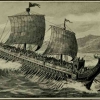(Raihan Al Yasin / Undergraduate Student of Islamic Education Management, Class 6D, UIN Sunan Gunung Djati Bandung)
The development of the International Standard Pioneer Madrasah (RMBI) model is a strategic effort to address the challenges of educational globalization while strengthening Islamic and national identity. Its background is rooted in the need to improve the quality of madrasah education to meet international standards without abandoning local values and Islamic spirituality. In this context, RMBI is expected to serve as an integrative platform combining technological advancement, global competence, and strong Islamic character. Moreover, RMBI responds to societal demands for Islamic educational institutions capable of producing excellent, academically competent, religiously moderate generations who are ready to compete in the digital age and knowledge-based economy.
First: Basic Concept of RSBI Madrasah (International Standard Pioneer School)
Definition: RSBI Madrasah is an Islamic educational institution that meets the eight National Education Standards (SNP) and is enriched with best practices from international education, such as a bilingual curriculum, international assessments, and ICT enhancement.
Goals and Objectives: RSBI aims to improve academic quality equivalent to OECD standards, enhance global competence (foreign language, digital literacy), foster Islamic-nationalist character, and develop an innovative ecosystem through strategic collaboration.
Legal Basis and Distinctive Features: The legal basis of RSBI is Law No. 20/2003 and Government Regulation No. 19/2005. Its unique characteristics include the integration of Islamic values with local culture, the use of Bahasa Indonesia as a lingua franca, a curriculum based on local wisdom, and the promotion of religious moderation.
Second: Background of RSBI Madrasah Importance
Philosophical: RSBI embodies education as the formation of a holistic human being (academic and spiritual), aligned with Dewey's philosophy and Islamic tarbiyah concepts.
Theological: Education is worship, and seeking knowledge is obligatory. RSBI is seen as a collective duty (fardhu kifayah) to nurture morally upright scholars.
Sociological: RSBI strengthens social cohesion through moderate and multicultural education and opens pathways for social mobility through academic excellence.
Anthropological: RSBI represents cultural adaptation, blending local and global values to form a hybrid identity for young Indonesian Muslims.
Economic: RSBI develops excellent human resources to support national economic growth, create new job opportunities, and promote microeconomic advancement.
Third: Standardization of RSBI Madrasah Implementation
Curriculum and Learning: Combines national curriculum with Cambridge/IB. Applies project-based, scientific, and digital technology-integrated learning models.
Students: Selective recruitment, foreign language development, exchange programs, and Islamic character formation.
Teacher Competence: Certified, bilingual teachers proficient in digital pedagogy and global learning strategies.
Facilities and Infrastructure: Complete facilities including labs, digital libraries, prayer rooms, internet access, and SIMSARPRAS-based management.
Educational Funding: Sources include national and local budgets, community, and private sectors. Managed transparently through online applications.
Management and Assessment: Based on good governance principles, internal quality assurance (SPMI), accreditation, and the EMIS system.
Fourth: RMBI Madrasah Management Strategies
Curriculum Implementation: Flexible, adaptive, and Islamically-rooted curriculum.
Innovative Teaching Methods: Uses PBL, LMS, case studies, and active discussion.
Human Resource Development: Regular training, comparative studies, and teacher learning communities.
Facility Management: Digitized and efficiently managed facilities.
School Culture Development: Promotes tolerance, literacy, and student leadership.
Efficient Financial Management: BOS and local funds managed with online reporting systems.
Quality Evaluation and Improvement: Includes regular audits, teacher evaluations, and institutional reflection.
Conclusion
RSBI combines national standards with international practices grounded in Islamic values. Its foundation involves philosophical, theological, sociological, anthropological, and economic aspects. Implementation standards cover curriculum, students, educators, facilities, funding, and management. Management strategies include adaptive curriculum, innovative methods, human resource development, school culture, and quality evaluation.
This material is sourced from Part 14 of the course "International Islamic Education Management" by Prof. Dr. H. Ahmad Rusdiana, Drs., MM.
Follow Instagram @kompasianacom juga Tiktok @kompasiana biar nggak ketinggalan event seru komunitas dan tips dapat cuan dari Kompasiana. Baca juga cerita inspiratif langsung dari smartphone kamu dengan bergabung di WhatsApp Channel Kompasiana di SINI







